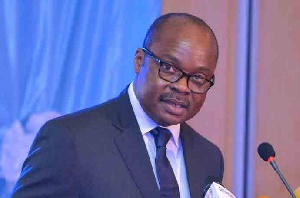 Dr Ernest Addison, BoG Governor
Dr Ernest Addison, BoG Governor
The history of public relations offers many exciting case studies.
When Michael Jackson was looking to make it really big, he went, together with his management team, to Coca-Cola. They literally begged to be hired at any price to advertise for Coca-Cola.
Coke was worried about ethnicity issues associated with a Michael Jackson brand and hence offered a disappointing US$1million.
The deal was not good but Coke was Coke and Coke was big.
Pepsi Cola, then not in the class of Coca-Cola took advantage of the situation and gave Michael US$5million.
The result was the Pepsi Generation that endeared many Americans to Pepsi!
When you hear that Coca-Cola rejected Michael, but you like Michael, what will you do?
During the Ghana 2008 Africa Cup of Nations football tournament, MTN was the official telecom sponsor. And there were other sponsors.
At the game venues, and within certain precincts of game venues, such as the approach routes, the sponsors were the only ones allowed to sell and promote their brands.
Rival companies placed their marketing agents in locations bordering those precincts and made significant sales with very minimal advertising cost.
Marketers call this ambush marketing.
Ambush marketing gained prominence during the 1984 Summer Olympic Games in Los Angeles, California.
So Ghanaians did learn from that history.
As a third example, if a child is singing a song, and another child who is at loggerheads with the singer is inspired by the song, (s)he may also raise a similar song.
The ensuing quarrel helps to resolve the conflict.
Such is the flux generated here by the Ghana Banking crisis.
Bank A messes up, the marketing team of Bank B, sees an opportunity to show it can do better.
Whilst, to show leadership, the public relations team of Bank C, issues a statement clarifying its policy position on the matter.
It helps to inspire public confidence.
And of course it’s good for business- ask any media house or advertising agency.
It is also ethical because the truth must be exposed.
Well, if you still didn’t get the drift, we at Writers and Shakespeares Ghana Limited have gone 48 hours out of the 48 hours timeline by which we expected the auditing firms that audited the Ghana Banking Awards to come out openly and disclose the work they did.
KPMG has come out to say that they haven’t been involved as ‘analysers’ of the Ghana Banking Awards since 2012 and hence cannot be mentioned as complicit in the ‘recent’ bank failures.
Indeed, KPMG stated that they do not audit any of the 28 banks that won the awards recently.
Writers and Shakespeares Ghana Limited through its blog writersghana.com, is calling on the auditors of the 28 banks with ‘recent’ Ghana banking awards displayed in their banking halls and in their advertisements to come out voluntarily with information on the matter.
Ace Ankomah’s article on Ghanaweb titled Ace Ankomah wants answers from Central Bank published 10 August, 2018 mentioned the Banks and Specialised Deposit-Taking Institutions Act (Act 930 of 2016).
This gives the Bank of Ghana powers to assist a bank that becomes ‘illiquid but solvent’ with monies as ‘a loan to a solvent bank’ and while also appointing Advisors to assist those banks solve their liquidity problems.
Sadly, there is evidence that the Bank of Ghana gave monies to banks without exercising the required oversight.
However, private companies are not required by law to publish their annual reports.
Hence, we can already see that even as we are compiling our questions, some lawyers will be advising the affected banks not to publish their financial statements.
All the seven- Capital Bank, UT Bank, BEIGE Bank, uniBANK, Royal Bank, Sovereign Bank and Construction Bank- are privately owned companies.
They may, therefore, decide not to heed our call to publish anything even as we have fired off emails to them and their probable auditors indicating our request and intentions.
Indeed from Ace Ankomah’s article, one can surmise that some banks that have not collapsed have received funds under Act 930 and wasted it.
Thus, there is a strong case to be made for amending Act 930 so that, ‘Any Bank that receives “a loan to a solvent bank’ whether private or public, must publish its annual report for the entire duration of the time it will take to clear this loan’.
The Institute of Chartered Accountants Ghana (ICAG) says it will sanction its members ‘who are found culpable in the collapse of these banks,’ reports myjoyonline.com on 8 August 2018.
Whilst we are compiling our searching questions we are glad to read that ICAG is not waiting for a formal complaint before it acts.
‘The professional standards and ethics committee of the Institute, in line with its mandate, has initiated the necessary inquiries on the matter and that an appropriate action will be taken if merit to the complaint is established,’ the ICAG Council wrote.
ICAG is responding to questions accountants and non-accountants are asking, the statement said.
This is PR; ‘to meet each other halfway on a two-way symmetrical street’.
Well done ICAG; you have shown good corporate behaviour.
In America, when President Obama released about US$700 billion in taxpayers monies to companies to keep them working and employing people, during the global financial crisis, what did they do?
They used them for staff bonuses and outstanding payments to shareholders.
Surely, as they discharge their manifest duty of protecting our national treasury, this fact must be known to our astute Bank of Ghana officials.
The writer is the managing consultant for Writers and Shakespeares Ghana Limited, a PR and integrated communications firm based in Accra. You may contact him with your feedback through ato@writersghana.com.